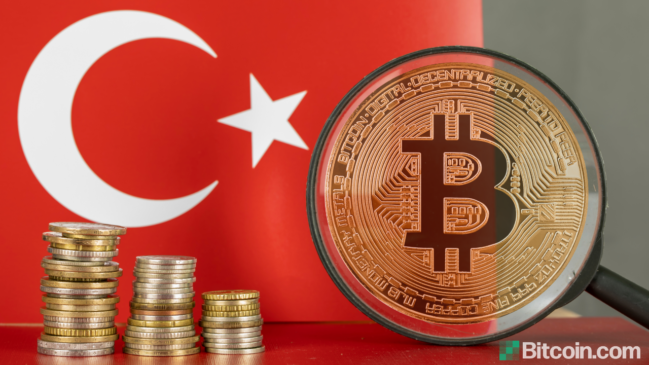People in Turkey are increasingly turning to bitcoin as the local currency, the Turkish lira, recently hit another record low against the dollar. Bitcoin adoption in Turkey outshines other countries in the region.
Turkey Is Regional Leader in Bitcoin Adoption
Bitcoin adoption has been increasing in Turkey as the local currency, the Turkish lira, hit another record low Thursday, reportedly touching 7.95 to the dollar. The dollar has gained about 33% against the lira so far this year and some analysts are predicting that it will soon hit 8.5. “The Turkish lira is getting smoked” and “will crash to new lows due to ‘unorthodox’ policies,” CNBC reported analysts explaining. “The lira’s underlying problem is the lack of credible inflation targeting by the central bank, which is bound to ultimately debase the currency,” Commerzbank analyst Tatha Ghose wrote in a note to clients last week.
The country has been suffering from high inflation and the unemployment rate is past 14%. Steve H. Hanke, Professor of Applied Economics at the Johns Hopkins University and a hyperinflation expert, said Turkey’s annual inflation rate is at 36.57% and climbing. “The lira is toast,” he tweeted Sunday. “Turkey is burning through its foreign exchange reserve like a house on fire,” the professor continued, noting that its reserves currently stand at $41.12 billion, down almost $10 billion since July.
Experts attribute Turkey’s high adoption of cryptocurrencies to economic uncertainty in the region and the extremely volatile lira. Ray Youssef, CEO of global peer-to-peer (P2P) bitcoin marketplace Paxful, said Thursday:
The rising inflation of the Turkish lira has been a major financial burden for Turkish citizens. Bitcoin can be used to preserve wealth against instability surrounding the Turkish lira.
Paxful also revealed Thursday that new registrations on its platform in Turkey increased 274% over the past 12 months. The company says it is seeing “massive potential for crypto adoption” in Turkey, which is why it is expanding its footprint in the country. Paxful has formed strategic partnerships with local cryptocurrency companies: Turkish lira-backed stablecoin Bilira (TRYB) provider and cryptocurrency trading platform Cointral. “We hope that by entering into the market we will be able to ease some of the financial burdens of its citizens,” Youssef remarked.
Blockchain analytics firm Chainalysis’ Geography of Cryptocurrency report, published in September, highlights how Turkey leads in cryptocurrency adoption in the Middle East. The report states:
Turkey is the highest-ranking country in the region on our Global Crypto Adoption Index at 29th overall, and also accounts for the most total transaction volume in the region.
Chainalysis’ global cryptocurrency adoption index ranks 154 countries. Besides Turkey, the countries with high adoption of cryptocurrencies in the Middle Eastern region are Iran (52nd) and Egypt (64th).
The top cryptocurrency exchange service providers in Turkey are Paribu, Btcturk, FTX, Huobi, Binance, Kraken, and Bitmex.
While Turkey currently has no cryptocurrency regulations, the country’s Capital Markets Board is developing a framework to oversee the cryptocurrency markets, with the goal to eventually enact regulations, the report details. Islam is the most practiced religion in the country. According to the government’s estimates, about 99.8% of the Turkish population of over 84 million people is Muslim. Recently, a shariah expert says that cryptocurrencies are legit commodities.
What do you think about bitcoin adoption in Turkey? Let us know in the comments section below.
Image Credits: Shutterstock, Pixabay, Wiki Commons
Disclaimer: This article is for informational purposes only. It is not a direct offer or solicitation of an offer to buy or sell, or a recommendation or endorsement of any products, services, or companies. Bitcoin.com does not provide investment, tax, legal, or accounting advice. Neither the company nor the author is responsible, directly or indirectly, for any damage or loss caused or alleged to be caused by or in connection with the use of or reliance on any content, goods or services mentioned in this article.





